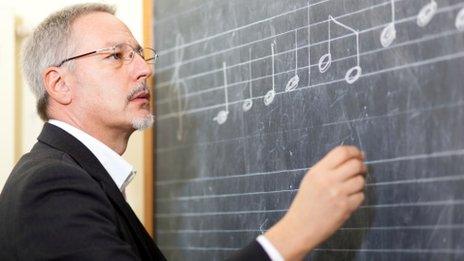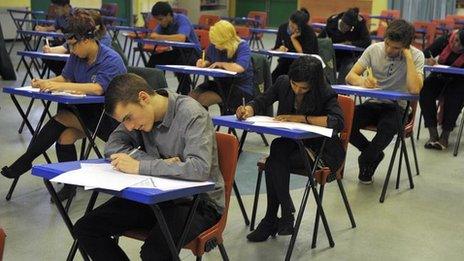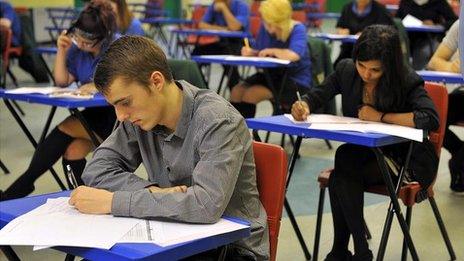'Tougher' exams and separate science practical test
- Published

Science practical experiments will be marked separately from A-level grades
There will be a stronger emphasis on maths skills and final end-of-course exams, as tougher, new-look GCSEs and A-levels for England are revealed.
But science practicals will no longer count towards A-level grades, but will become a separate test.
Maths skills will become more important in other subjects, such as physics, geography and economics.
Education Secretary Michael Gove said the changes would correct "pernicious damage" caused by "dumbing down".
"Our changes will make these qualifications more ambitious, with greater stretch for the most able; will prepare young people better for the demands of employment and further study," said the education secretary.
'Robust'
Head teachers' leader Brian Lightman warned that schools and pupils faced "enormous pressure" and confusion during the switch to the new exams.
"Hastily implemented changes on such a scale carry an enormous risk," said Mr Lightman.

Arts subjects such as music are to have revised exams
The Royal Geographical Society backed the changes as a "robust curriculum with an enhanced level of demand" and said the "explicit requirements for the use of mathematics and statistics in geography is also particularly welcome".
But the decision by the Ofqual exam regulator to separate the mark for practicals from the main A-level grade in physics, chemistry and biology has drawn criticism from an alliance of science organisations.
Score, which represents organisations including the Institute of Physics, Royal Society, Royal Society of Chemistry, the Society of Biology and the Association for Science Education, described Ofqual's plan as "inadequate".
Prof Julia Buckingham, chair of Score and vice chancellor of Brunel University, says that universities looking at applications will see the A-level grade "as a full reflection of a student's knowledge and ability" and will miss the practical work "which is an integral component of science learning".
The Campaign for Science and Engineering warned that "uncoupling practicals from science A-level grades will lead to practicals being deprioritised".
Ofqual says the switch away from including science practical marks in A-level exam grades is because such assessed experiments have become a narrow and predictable process, with pupils' results "bunched around the top of the scale".
The exam regulator has still to decide how science practicals should be assessed at GCSE.
More maths
The announcements by the education secretary and the exam regulator set out the content and assessment of GCSEs and A-levels, which will be phased in from 2015 and 2016.
The content of the subjects will include:
A-levels, to be taught from September 2015:
Science: At least 12 practical experiments in chemistry, biology and physics. But they will be assessed as a pass or fail separately from the A-level grade. More mathematical knowledge will be expected in physics. Exams will be 100% of final grade
History: Topics will need to cover at least 200 years rather than 100 years. There will also be a specific theme to be studied with a 100-year period. Exams will be 80% of final grade.
English literature: An "unseen text" to promote wider and more critical reading. Exams will be 80% of final grade.
Economics: More maths and introduction of role of central banks and financial regulation. Exams 100% of final grade.
Computer science: More focus on programming, algorithms and problem-solving. Exams 80% of final grade
GCSEs, to be taught from September 2016:
Sciences: "Cutting-edge content" such as human genome in biology, nanoparticles in chemistry, and energy and space in physics. More maths in all science. No decision yet on how practical experiments should be assessed
History: A wider range of historical periods to be studied, with three eras - medieval (500-1500), early modern (1450-1750) and modern (1700-present day). More emphasis on UK history. Exams 100% of grade
Geography: Schools will have to confirm that students have completed two pieces of fieldwork. Exams 100% of grade, but will include questions about fieldwork topics. More maths and more emphasis on UK geography
Modern languages: Requirement that "questions are asked in the respective foreign language". More translating from English into the foreign language.
There have already been details set out for the first three of the new type of GCSE, which will be English language, English literature and maths, to be taught from September 2015.
The education secretary has also announced that there will be more "rigorous and demanding" A-levels and GCSEs in arts subjects, including music, drama, art and dance.
They will be taught from September 2016, alongside changes to A-levels in RE and design and technology.
Changes to the structure of exams have already been announced - such as shifting from modules to exams at the end of two years.
Last week, exam regulator Ofqual announced that new-style GCSEs would be graded from 9 to 1, with the highest grade to be twice as hard as an A*.
Changes to the structure of exams have already been announced - such as shifting from modules to exams at the end of two years.
Mr Lightman, leader of the Association for School and College Leaders, said he was "very concerned about the amount of simultaneous change".
"The success of these very ambitious changes will depend on effective implementation and high quality communication and preparation for schools from the awarding bodies.
"We still have not seen specific content for the exams nor details of how it will be assessed. Therefore there is no way of saying with any certainty that these new qualifications will be tougher than what is now in place."
- Published3 April 2014

- Published11 June 2013

- Published19 September 2013